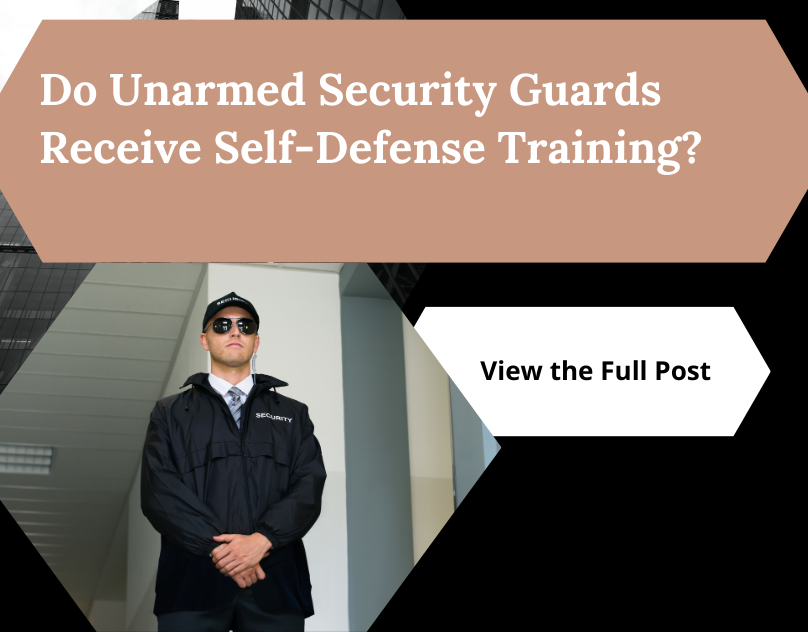Do Unarmed Security Guards Receive Self-Defense Training?
- securityguardsservicesblog
- Aug 17, 2025
- 3 min read

When people think about an unarmed Security guard, the first question that often comes to mind is whether they are capable of protecting themselves and others without carrying a weapon. The answer lies in the extensive training they receive, which includes not only observation and reporting but also self-defense strategies. These professionals are taught how to stay alert, handle conflicts with calm authority, and protect their assigned premises effectively. Their role focuses more on prevention, yet the ability to defend themselves when necessary is a critical skill that ensures safety in a variety of environments.
Understanding the Responsibilities
An Unarmed Security guard is entrusted with maintaining order, monitoring activity, and responding to emergencies. Their presence alone deters potential troublemakers, but they are not simply passive observers. They are trained to identify risks, manage confrontations, and assist people in distress. Duties often include patrolling designated areas, checking entry points, enforcing company policies, and reporting incidents to supervisors or law enforcement when required. This broad set of responsibilities makes self-defense training an essential part of their preparedness.
Importance of Self-Defense Training
Although guards do not carry firearms, they may encounter aggressive or uncooperative individuals. Self-defense training ensures they can react appropriately without escalating the situation. The main objectives of such training include:
Personal safety: Guards learn defensive tactics to protect themselves during confrontations.
Public protection: They can shield employees, customers, or residents from harm until further assistance arrives.
Conflict resolution: Training emphasizes de-escalation before physical action is taken.
Professional conduct: Guards are taught to apply only the minimum necessary force, following legal and ethical standards.
What Training Typically Covers?
The training curriculum for security professionals is designed to balance physical techniques with mental preparedness. Some of the most common areas include:
1. Verbal Communication and De-escalation
Using words, tone, and body language to reduce tension and avoid physical altercations.
2. Defensive Maneuvers
Practical skills such as blocking, evading, or holding techniques that allow guards to protect themselves without causing serious harm.
3. Situational Awareness
Recognizing early warning signs of danger and reacting quickly to prevent escalation.
4. Legal Awareness
Understanding laws surrounding the use of force is crucial, as it ensures their actions remain within professional and legal boundaries.
Why Do Businesses Value Trained Guards?
For businesses, hiring personnel with proper self-defense training is a practical investment. It improves workplace safety, reduces liability, and builds trust among staff and visitors. A trained professional is less likely to panic in a crisis and more likely to control situations effectively. In retail stores, schools, hospitals, and offices, this reliability is crucial for day-to-day operations.
Self-Defense vs. Armed Protection
It's important to distinguish between the role of an Unarmed Security guard and that of an armed counterpart. Armed guards are often deployed in high-risk facilities such as banks or government institutions. By contrast, unarmed guards serve in everyday environments where a lower profile and customer-friendly approach are required. Their focus is on prevention and control rather than force, and their self-defense training complements this responsibility perfectly.
Certification and Standards
Depending on the region, security professionals may need to complete licensed training programs to be eligible for employment. These programs cover both classroom instruction and practical exercises, ensuring guards are prepared for real-world scenarios. Many states also mandate refresher courses to keep skills sharp and up to date.
Conclusion
Self-defense training is an essential part of preparing professionals to handle the challenges of security work. While they may not carry weapons, guards learn the skills needed to protect themselves and others, maintain order, and keep environments safe. By combining observation, communication, and defensive tactics, they provide effective security solutions without escalating situations unnecessarily.
For further insights on their role in specific environments, you may also refer to the presentation:
Comments